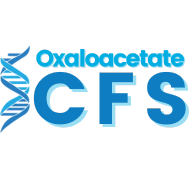Metabolic Cell Changes in ME/CFS
The body responds to illness and injury through changes in metabolism. These changes help the body fight infection and repair tissues.
Sometimes, the metabolic changes that are turned on to defend the body don’t turn off– even after the infection or injury are resolved.
Failure to turn metabolism back to normal may be the cause of ME/CFS.
Five Metabolic Changes that Remain in ME/CFS Patients
- A. Chronic Inflammation Activation via the NF-kB Pathway
- B. Increased Glycolysis (the Warburg Effect), and Alternative Energy Production in the Cytoplasm instead of the Mitochondria
- C. Decreased NAD+/NADH Ratio
- D. Mitochondrial Malfunction
- E. Reduced Activation of AMPK
Kandasamy M. NF-κB signalling as a pharmacological target in COVID-19: potential roles for IKKβ inhibitors [published online ahead of print, 2021 Jan 4]. Naunyn Schmiedebergs Arch Pharmacol. 2021;1-7. doi:10.1007/s00210-020-02035-5 https://www.ncbi.nlm.nih.gov/pmc/articles/PMC7780215/
Gupta SC, et. al. Role of nuclear factor κB-mediated inflammatory pathways in cancer-related symptoms and their regulation by nutritional agents. Exp Biol Med (Maywood). 2011 Jun 1;236(6):658-71. doi: 10.1258/ebm.2011.011028. Epub 2011 May 12. PMID: 21565893; PMCID: PMC3141285. https://pubmed.ncbi.nlm.nih.gov/21565893/
Bower JE, Ganz PA, Irwin MR, Arevalo JM, Cole SW. Fatigue and gene expression in human leukocytes: increased NF-κB and decreased glucocorticoid signaling in breast cancer survivors with persistent fatigue. Brain Behav Immun. 2011 Jan;25(1):147-50. doi: 10.1016/j.bbi.2010.09.010. Epub 2010 Sep 18. PMID: 20854893; PMCID: PMC3603145 https://pubmed.ncbi.nlm.nih.gov/20854893/
Morris G, Maes M. Increased nuclear factor-κB and loss of p53 are key mechanisms in Myalgic Encephalomyelitis/chronic fatigue syndrome (ME/CFS). Med Hypotheses. 2012 Nov;79(5):607-13. doi: 10.1016/j.mehy.2012.07.034. Epub 2012 Aug 27. PMID: 22951418. https://pubmed.ncbi.nlm.nih.gov/22951418/
Kornberg MD. The immunologic Warburg effect: Evidence and therapeutic opportunities in autoimmunity. Wiley Interdiscip Rev Syst Biol Med. 2020 Sep;12(5):e1486. doi: 10.1002/wsbm.1486. Epub 2020 Feb 27. PMID: 32105390; PMCID: PMC7507184. https://pubmed.ncbi.nlm.nih.gov/32105390/
Icard P, Lincet H, Wu Z, Coquerel A, Forgez P, Alifano M, Fournel L. The key role of Warburg effect in SARS-CoV-2 replication and associated inflammatory response. Biochimie. 2021 Jan;180:169-177. doi: 10.1016/j.biochi.2020.11.010. Epub 2020 Nov 12. PMID: 33189832; PMCID: PMC7659517. https://pubmed.ncbi.nlm.nih.gov/33189832/
Lawson N, Hsieh CH, March D, Wang X. Elevated Energy Production in Chronic Fatigue Syndrome Patients. J Nat Sci. 2016;2(10):e221. PMID: 27747291; PMCID: PMC5065105.://pubmed.ncbi.nlm.nih.gov/27747291/Sweetman E, Kleffmann T, Edgar C, de Lange M, Vallings R, Tate W. A SWATH-MS analysis of Myalgic Encephalomyelitis/Chronic Fatigue Syndrome peripheral blood mononuclear cell proteomes reveals mitochondrial dysfunction. J Transl Med. 2020 Sep 24;18(1):365. doi: 10.1186/s12967-020-02533-3. PMID: 32972442; PMCID: PMC7512220. https://pubmed.ncbi.nlm.nih.gov/32972442/
Filler K, Lyon D, Bennett J, McCain N, Elswick R, Lukkahatai N, Saligan LN. Association of Mitochondrial Dysfunction and Fatigue: A Review of the Literature. BBA Clin. 2014 Jun 1;1:12-23. doi: 10.1016/j.bbacli.2014.04.001. PMID: 25147756; PMCID: PMC4136529. https://pubmed.ncbi.nlm.nih.gov/25147756/
Brown AE, Jones DE, Walker M, Newton JL. Abnormalities of AMPK activation and glucose uptake in cultured skeletal muscle cells from individuals with chronic fatigue syndrome. PLoS One. 2015 Apr 2;10(4):e0122982. doi: 10.1371/journal.pone.0122982. PMID: 25836975; PMCID: PMC4383615. https://pubmed.ncbi.nlm.nih.gov/25836975/
